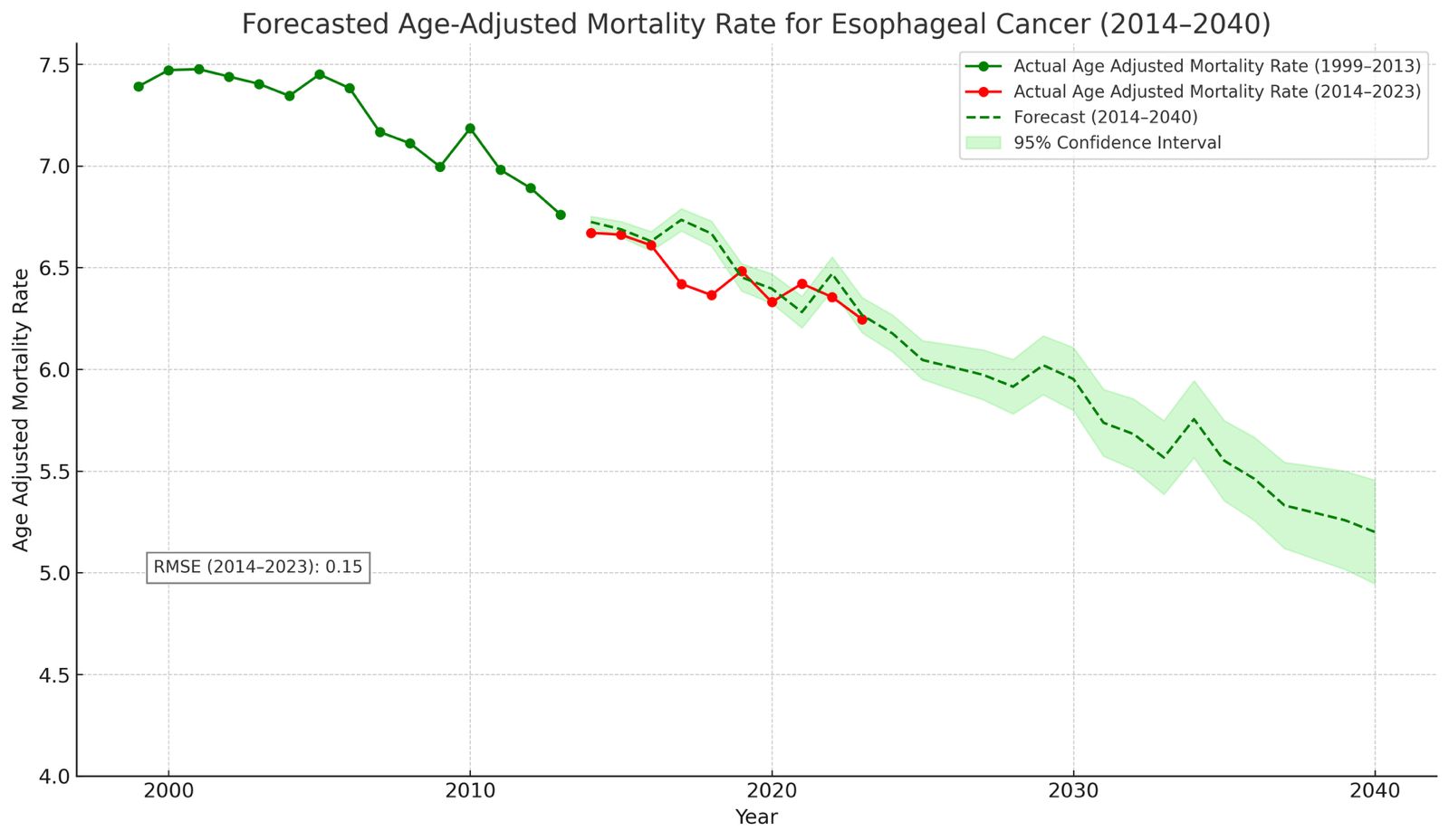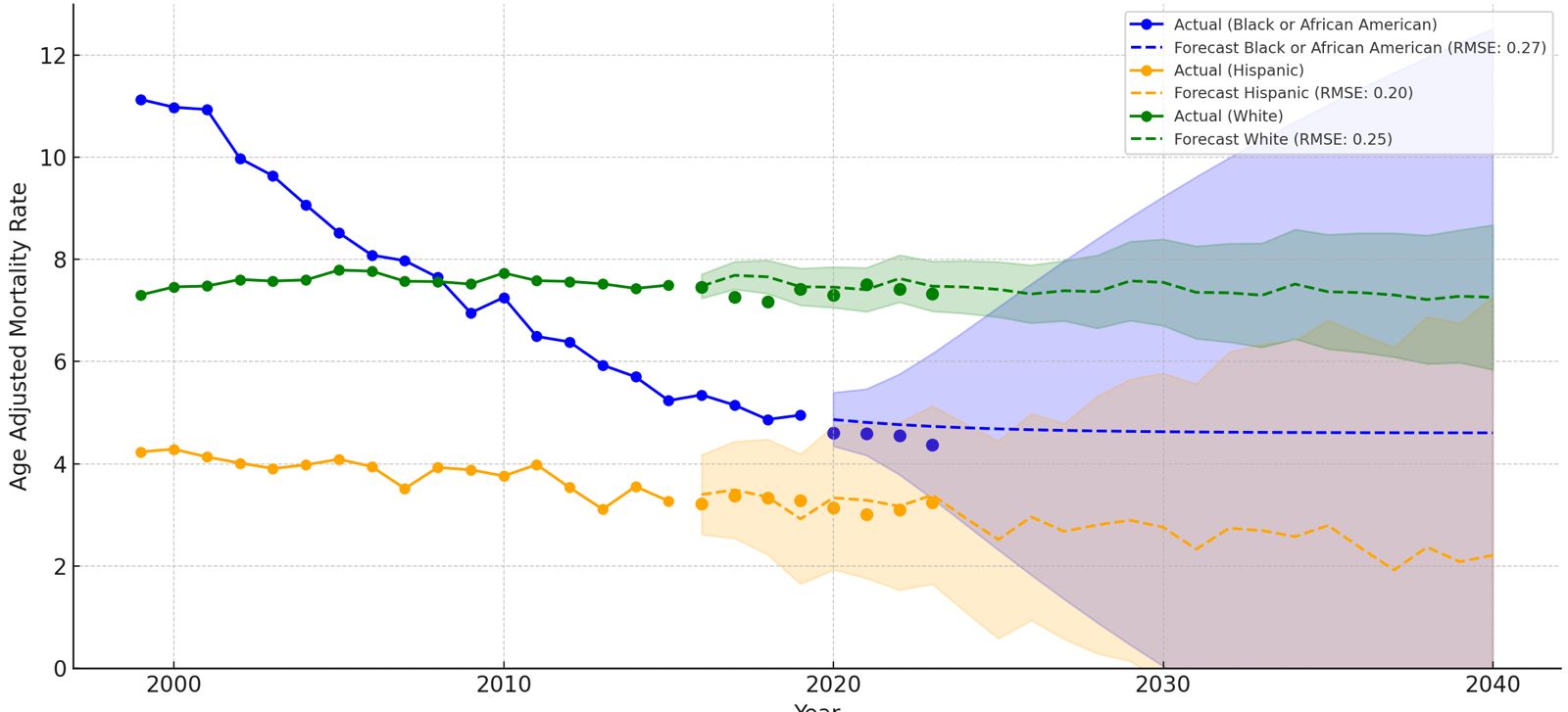Tuesday Poster Session
Category: Esophagus
P4941 - Machine Learning-Based Predictive Analysis of Declining Esophageal Cancer Mortality in the United States: A Time Series Modeling Approach
Tuesday, October 28, 2025
10:30 AM - 4:00 PM PDT
Location: Exhibit Hall
.jpg)
Sameer Ali, MD
Desert Valley Hospital
Victorville, CA
Presenting Author(s)
Sameer Ali, MD1, Noor Ul Huda Ramzan, MD2, Fariq Akhtar Aziz, MD1, Saif Ur Rehman, MBBS3, Mian Uman Anwar, MBBS3, Muhammad Bilal Hashmat, MBBS3, Hammad Jehangir, MBBS4, Saher Ashraf, MBBS3, Muhammad Bilal, MBBS5, Hafiz Ali Raza, MBBS3, Amna Amjad, MBBS3
1Desert Valley Hospital, Victorville, CA; 2University of Texas Southwestern Medical Center, Dallas, TX; 3Punjab Medical College, Faisalabad, Punjab, Pakistan; 4Allama Iqbal Medical College, Lahore, Punjab, Pakistan; 5Punjab Medical College, Faisalabad, CA
Introduction: Esophageal cancer remains a significant cause of cancer-related mortality worldwide. This study presents a forecast of U.S. age-adjusted mortality rates from 2014 to 2040, providing insight into future disease burden and a comparison based on race.
Methods: We utilized data from the CDC WONDER database spanning 1999 to 2023 to examine esophageal cancer-related mortality, identified using ICD-10 codes C15.0. Mortality was assessed using crude mortality rates (CMRs) per 100,000 population, with stratification by age, sex, and race. Temporal patterns were analyzed through annual and average annual percent changes (APC and AAPC), employing the empirical quantile method for confidence intervals. A Seasonal Autoregressive Integrated Moving Average (SARIMA) model was developed to forecast mortality trends through 2040, trained on data from 1999 to 2014, and validated with figures from 2015 to 2023 using time series cross-validation. Model accuracy was evaluated via root mean square error (RMSE), and projections were extended to 2040.
Results: Between 1999 and 2023, the age-adjusted mortality rate (AAMR) for esophageal cancer in the U.S. declined from 7.39 to 6.25 per 100,000, reflecting an average annual percent change of –0.7%. Crude mortality rates (CMR) remained relatively stable, rising slightly from 7.26 to 7.72 per 100,000 over the same period. Males consistently exhibited higher mortality than females, with AAMR decreasing from 12.46 to 10.46 in men, and from 3.01 to 2.70 in women.
Our model forecasts that the overall AAMR mortality from esophageal cancer will decrease from 6.25/100,000 in 2023 to 5.20/100,000 in 2040. The average annual percentage change will be -1.08% over the next 17 years, resulting in a relative reduction of 16.8% in mortality due to esophageal cancer.
The biggest change in mortality will occur in African American individuals, declining from a mortality rate of 11.13 in 1999 to 3.74 in 2040. At the same time, the morality rate for Whites will remain relatively stable, only declining from 7.30 to 6.55 from 1999 to 2040. Hispanic populations will observe a decline from 4.26 in 1999 to 2.70 in 2040.
Discussion: Our analysis reveals that esophageal cancer mortality will continue to decline over the next 17 years through 2040. The most significant progress has been made in African American populations, and they will continue to see a further decline in the AAMR. Further studies are needed to understand the slow rate of change in white populations compared to other races.

Figure: Figure 1: Overall age-adjusted mortality rate for esophageal cancer with forecast from 2014 through 2040.

Figure: Figure 2: Breakdown by race of age-adjusted mortality rate for esophageal cancer through 2040.
Disclosures:
Sameer Ali indicated no relevant financial relationships.
Noor Ul Huda Ramzan indicated no relevant financial relationships.
Fariq Akhtar Aziz indicated no relevant financial relationships.
Saif Ur Rehman indicated no relevant financial relationships.
Mian Uman Anwar indicated no relevant financial relationships.
Muhammad Bilal Hashmat indicated no relevant financial relationships.
Hammad Jehangir indicated no relevant financial relationships.
Saher Ashraf indicated no relevant financial relationships.
Muhammad Bilal indicated no relevant financial relationships.
Hafiz Ali Raza indicated no relevant financial relationships.
Amna Amjad indicated no relevant financial relationships.
Sameer Ali, MD1, Noor Ul Huda Ramzan, MD2, Fariq Akhtar Aziz, MD1, Saif Ur Rehman, MBBS3, Mian Uman Anwar, MBBS3, Muhammad Bilal Hashmat, MBBS3, Hammad Jehangir, MBBS4, Saher Ashraf, MBBS3, Muhammad Bilal, MBBS5, Hafiz Ali Raza, MBBS3, Amna Amjad, MBBS3. P4941 - Machine Learning-Based Predictive Analysis of Declining Esophageal Cancer Mortality in the United States: A Time Series Modeling Approach, ACG 2025 Annual Scientific Meeting Abstracts. Phoenix, AZ: American College of Gastroenterology.
1Desert Valley Hospital, Victorville, CA; 2University of Texas Southwestern Medical Center, Dallas, TX; 3Punjab Medical College, Faisalabad, Punjab, Pakistan; 4Allama Iqbal Medical College, Lahore, Punjab, Pakistan; 5Punjab Medical College, Faisalabad, CA
Introduction: Esophageal cancer remains a significant cause of cancer-related mortality worldwide. This study presents a forecast of U.S. age-adjusted mortality rates from 2014 to 2040, providing insight into future disease burden and a comparison based on race.
Methods: We utilized data from the CDC WONDER database spanning 1999 to 2023 to examine esophageal cancer-related mortality, identified using ICD-10 codes C15.0. Mortality was assessed using crude mortality rates (CMRs) per 100,000 population, with stratification by age, sex, and race. Temporal patterns were analyzed through annual and average annual percent changes (APC and AAPC), employing the empirical quantile method for confidence intervals. A Seasonal Autoregressive Integrated Moving Average (SARIMA) model was developed to forecast mortality trends through 2040, trained on data from 1999 to 2014, and validated with figures from 2015 to 2023 using time series cross-validation. Model accuracy was evaluated via root mean square error (RMSE), and projections were extended to 2040.
Results: Between 1999 and 2023, the age-adjusted mortality rate (AAMR) for esophageal cancer in the U.S. declined from 7.39 to 6.25 per 100,000, reflecting an average annual percent change of –0.7%. Crude mortality rates (CMR) remained relatively stable, rising slightly from 7.26 to 7.72 per 100,000 over the same period. Males consistently exhibited higher mortality than females, with AAMR decreasing from 12.46 to 10.46 in men, and from 3.01 to 2.70 in women.
Our model forecasts that the overall AAMR mortality from esophageal cancer will decrease from 6.25/100,000 in 2023 to 5.20/100,000 in 2040. The average annual percentage change will be -1.08% over the next 17 years, resulting in a relative reduction of 16.8% in mortality due to esophageal cancer.
The biggest change in mortality will occur in African American individuals, declining from a mortality rate of 11.13 in 1999 to 3.74 in 2040. At the same time, the morality rate for Whites will remain relatively stable, only declining from 7.30 to 6.55 from 1999 to 2040. Hispanic populations will observe a decline from 4.26 in 1999 to 2.70 in 2040.
Discussion: Our analysis reveals that esophageal cancer mortality will continue to decline over the next 17 years through 2040. The most significant progress has been made in African American populations, and they will continue to see a further decline in the AAMR. Further studies are needed to understand the slow rate of change in white populations compared to other races.

Figure: Figure 1: Overall age-adjusted mortality rate for esophageal cancer with forecast from 2014 through 2040.

Figure: Figure 2: Breakdown by race of age-adjusted mortality rate for esophageal cancer through 2040.
Disclosures:
Sameer Ali indicated no relevant financial relationships.
Noor Ul Huda Ramzan indicated no relevant financial relationships.
Fariq Akhtar Aziz indicated no relevant financial relationships.
Saif Ur Rehman indicated no relevant financial relationships.
Mian Uman Anwar indicated no relevant financial relationships.
Muhammad Bilal Hashmat indicated no relevant financial relationships.
Hammad Jehangir indicated no relevant financial relationships.
Saher Ashraf indicated no relevant financial relationships.
Muhammad Bilal indicated no relevant financial relationships.
Hafiz Ali Raza indicated no relevant financial relationships.
Amna Amjad indicated no relevant financial relationships.
Sameer Ali, MD1, Noor Ul Huda Ramzan, MD2, Fariq Akhtar Aziz, MD1, Saif Ur Rehman, MBBS3, Mian Uman Anwar, MBBS3, Muhammad Bilal Hashmat, MBBS3, Hammad Jehangir, MBBS4, Saher Ashraf, MBBS3, Muhammad Bilal, MBBS5, Hafiz Ali Raza, MBBS3, Amna Amjad, MBBS3. P4941 - Machine Learning-Based Predictive Analysis of Declining Esophageal Cancer Mortality in the United States: A Time Series Modeling Approach, ACG 2025 Annual Scientific Meeting Abstracts. Phoenix, AZ: American College of Gastroenterology.
